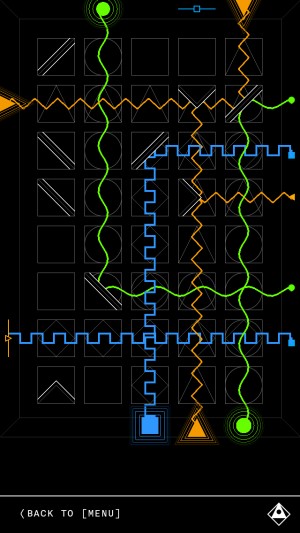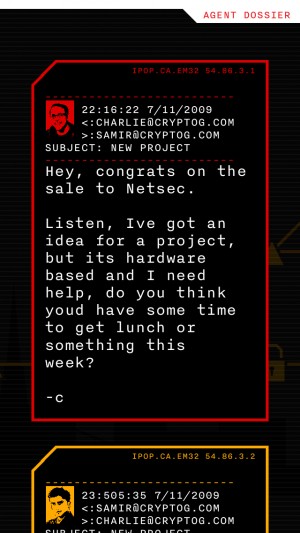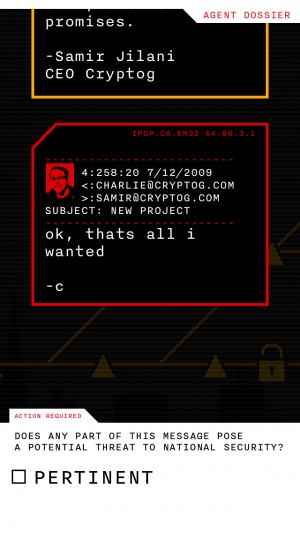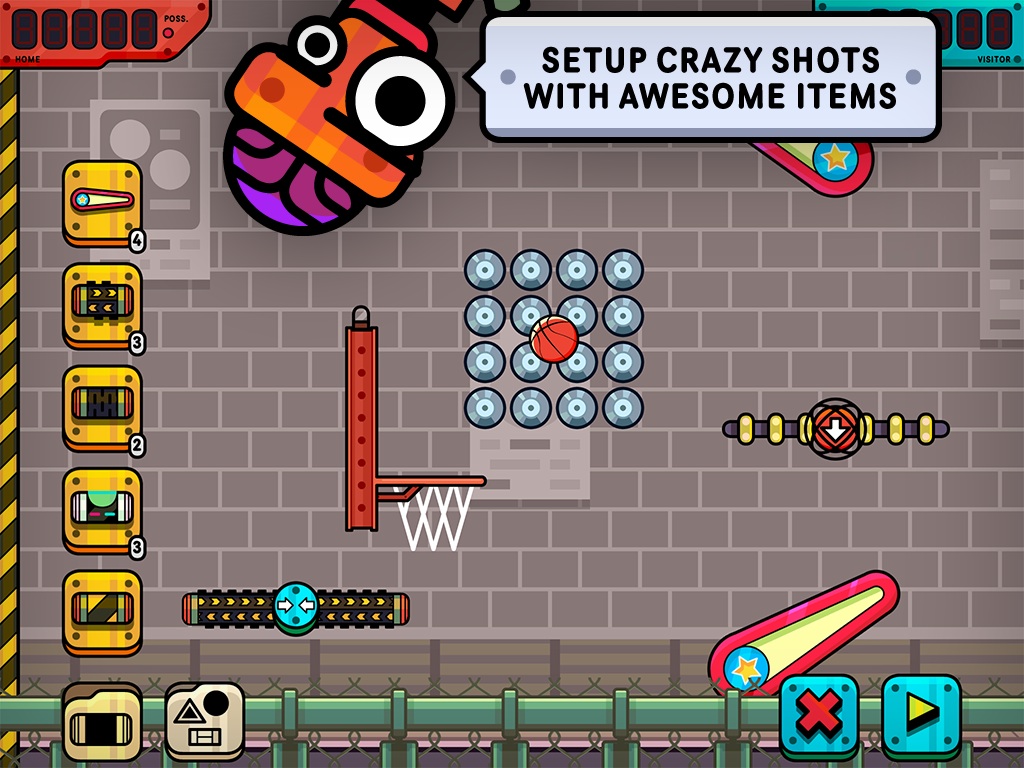 TouchTone ($2.99) is Mikengreg’s first game since Gasketball (Free), the fun physics/basketball game that unfortunately was a financial flop. Between other projects, the two kept tinkering away on the concept that eventually became TouchTone, a puzzle game that integrates themes of surveillance and spying, inspired by world events. I spoke with Mike Boxleiter and Greg Wohlwend about the game, and found out how the game took 2 days to make its core gameplay, but over 2 years for the whole politically-charged package to come together.
TouchTone ($2.99) is Mikengreg’s first game since Gasketball (Free), the fun physics/basketball game that unfortunately was a financial flop. Between other projects, the two kept tinkering away on the concept that eventually became TouchTone, a puzzle game that integrates themes of surveillance and spying, inspired by world events. I spoke with Mike Boxleiter and Greg Wohlwend about the game, and found out how the game took 2 days to make its core gameplay, but over 2 years for the whole politically-charged package to come together.
 Touch Arcade: How did TouchTone come about?
Touch Arcade: How did TouchTone come about?
Mike Boxleiter: So Gasketball came out, and we did a road trip right afterward to Andy Moore’s Orca Jam. It was gonna be like a victory road trip, but it ended up being the opposite of that, a defeat road trip, because Gasketball did pretty bad. So just as an exercise to get my mind off of it, I was trying to come up with something new, that I could do at the jam, something really small and perfect, and in the 48 hours of the jam, I kind of completely made, not the entire game as it stands now, but like all the mechanics were there, the Rubik Cube thing…the mirrors and the bouncing and lasers and all that stuff were fully formed. And then it took the rest of the time until now to come up with the rest of the game, stuff that made it have meaning and purpose. It’s been a long journey.
Greg Wohlwend: It’s been a lot of off and on, tabling it, working on other stuff, that kind of thing. It’s not really a game that should take two and a half years, but sometimes games take…you work on it for a month or two, you think “ah well, this isn’t working, it’s not right" and then you work on something else, come up with a new idea and a fresh perspective, and try something else out.
Touch Arcade: Yeah, because the game is a pretty cool idea, it’s just not something that you would hope would take two and a half years!
Both: Yeah, right?
Touch Arcade: As you said, the core game came together but the whole sort of story and concept, how did you go from, you have these signals bouncing off of everything and whatnot to building the structure around this?
Mike Boxleiter: We were kind of casting around for a theme for the game for a long time, trying to figure out what it should look like. First, it was based off of light, lasers, and prisms and stuff. And then Greg kept missing with ideas and thinking we could make it signal and sound based. For a little while we were going to try to take the audio, and have it be the components of the beams that you’re using a level, like when you would hook up a certain sine wave or something, it would make part of the music come up, or a sound effect or something, it would all kind of work together as an audio thing. But that wound up being weird and challenging for all sorts of reasons so we bailed on that. And then we thought it kind of felt like a hacking minigame from a bigger AAA game like BioShock ($9.99) or System Shock, it sort of felt like maybe you were hacking into sensitive material or something, and then the Snowden revelations happened, in Summer 2013.
And so we felt like say something interesting about Snowden and do something satirical to couch the game in hacking concepts that might be interesting to people. At first we were just going to have a jokey satire treatment to it, and we ended up spending way too long and getting way too deep into telling a story and having a political message.
 Touch Arcade: So this is definitely a game that if you had worked on it full-time right after you came up with the core concept, this would have been a dramatically different game than it is now.
Touch Arcade: So this is definitely a game that if you had worked on it full-time right after you came up with the core concept, this would have been a dramatically different game than it is now.
Greg Wohlwend: Yeah, if we had been like “oh, let’s just release this," and that’s what it was for a good year. Throughout the year, we didn’t really believe in the direction of, “Let’s make this puzzle game and put on a grid of levels and had it be, you need to get a star on this one, or points, or et cetera…" I mean, you never really know. Just chunking through [the puzzles] in a rote way just wasn’t interesting to us. But we are always are trying to find something that makes a game special, and kind of endears the game to us.
Mike Boxleiter: Yeah, we had friends playing an earlier version that was just a big matrix of levels, and you play them one after another, and it kind of felt like a boring Flash game, not really like it was doing anything for them. So we felt like we needed to find something more compelling, more interesting, to tie everything into a cohesive package instead of throwing a bunch of puzzles out there into the aether.
Touch Arcade: And it always is a challenge, especially with puzzle games. What makes this interesting, why should people care about this?
Greg Wohlwend: Yeah, and there’s plenty of games that don’t care about that either, and they do fine and people love them and that’s fine. But for us, we just weren’t convinced, so we kept at it.
Touch Arcade: And even with some puzzle games, it can be about conveying a certain emotion, or look at Threes ($5.99). And obviously you know about that, Greg, because you worked on it. But a huge part of the appeal of that is, the main game is fun, but the charming characters that give it personality. So, this is kind of the opposite of Threes in terms of it’s not a cheery game, but TouchTone is kind of meant to have a personality to it, and a reason to do things beyond “here’s the puzzle."
Greg Wohlwend: Yeah, and I think that Threes from a game design perspective, it’s just the one thing, right? It’s a score game. It’s about improving your own skill and your own grasp of the game system. Whereas TouchTone is about going through these levels. So when you have something that’s a set “This is the level, and there are only so many of them," and you can just go through them one by one. But that wasn’t enough for us. That’s where we had to kind of innovate. It was a different experience for both of us. We’ve never really worked on a game that involved more than a few paragraphs of text. We’re kind of adverse to text, or at least I am, in games.
Mike Boxleiter: Yeah, our biggest worry is that no one will read anything, and just not glob on to the story. But so far people seem to be engaging with it and interested.
Touch Arcade: It’s funny you mention the whole text thing, because pretty early on, after you complete the tutorials, there’s a lot of text! Text happens a lot in this game!
Greg Wohlwend: Yeah, it’s certainly like, I don’t know how many words, but there’s a lot. Like, 20k-plus words, more than that? Yeah, he doesn’t know. But it’s a lot of writing.
Mike Boxleiter: Yeah, I just wrote it and didn’t ever go back to it. I don’t think about it.
Touch Arcade: So Mike, you actually did most of the writing on the game?
Mike Boxleiter: Yeah, I just kind of locked myself in my apartment for five months, and every time I came out with a new chapter, Greg and I would come together on it, make notes, make changes on it, and made sure everything made sense. But yeah, it’s the first time I’ve ever written anything professionally, it was a huge learning process, and it took me way longer than I ever imagined it would take. Designing a story that makes sense with characters that all have internal motivations and be consistent, it’s a very involved process. It felt a lot like engineering in a way, only certain characters can do certain things, they have a backstory, and ways they should be acting, and trying to get everything to the point I wanted it to be, and say the things that I wanted to say was just a really long and exhausting process. But it was really interesting too.
 Touch Arcade: And getting really into the theme of the game, and everything about it, are you concerned at all about any kind of blowback from people that play this game, and make them mad at all? You don’t see a lot of political games that make it out there onto the App Store, particularly.
Touch Arcade: And getting really into the theme of the game, and everything about it, are you concerned at all about any kind of blowback from people that play this game, and make them mad at all? You don’t see a lot of political games that make it out there onto the App Store, particularly.
Mike Boxleiter: We were a little worried that Apple was going to be not too receptive to it, but so far we haven’t heard anything negative from them, so it’s kind of up in the air. But they’re not blocking us or anything. [Author’s Note: Apple gave the game a front-page feature when it released] But like, I didn’t want the story to be super heavy-handed and telling people what to think and how to feel about the situation, I more just wanted to create interesting context for people to think about all the questions we have floating around the national consciousness, and my read on ways that we can think about it.
It’s kind of a thought experiment for me, how can I create a situation thematically that exposes a lot of these problematic issues in ways that people might not have thought about. So hopefully, someone does get angry and they talk about it, and that creates a conversation, and that would be interesting to me. That would be really interesting to me if we could discuss these things, and get outside of just my head, where all of this has been going on so far. Any feedback would be entertaining for me, at the least.
Touch Arcade: I have to imagine it really is a writing challenge to do that, to make the story feel, to get your point across without feeling heavy-handed. It can be easy for games with a message to really try to hammer it down, but to make something that’s engaging as a game, and to get the point across in a subtle way. I imagine that’s a lot different from the process of making Gasketball, for example.
Mike Boxleiter: Totally. We’ve never done this before, and we have no barometer for how well we’re doing. With Gasketball it was a lot easier to understand if a level was good or bad, or if a UI decision was making things easier or harder for people to get into the game. But with the writing…I can’t create a laboratory experience of somebody downloading the game for the first time and playing it through, and experiencing the thing organically. We had a few tests with people showing up at the Logan Theatre in public and playing the game, but it wasn’t like the experience that you would get at home sitting on your couch, or on a train with your earphones in, playing the game in a private way.
And so we didn’t really know how people were going to react to it. And we still don’t know on a larger scale. It’s still a real big mystery of whether or not people are going to get it and what we’re doing and what we’re trying to say.
Thanks to Mike and Greg for their time.
